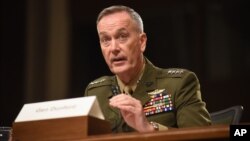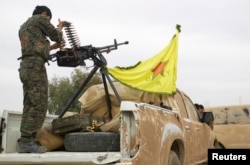The Chairman of the U.S. Joint Chiefs of Staff, General Joseph Dunford, is visiting Turkey as regional tensions rise. Ankara is an ally in the US-led war against Islamic State group, but Dunford's visit comes as Turkey is alarmed over recent gains by Syrian Kurds.
The war against Islamic State is expected to top the agenda during Dunford's visit. Turkey, which borders Iraq and Syria, is viewed by Washington as key to the battle against the jihadist group. But political columnist Semih Idiz of Turkey’s Cumhuriyet newspaper says Dunford is aware cooperation has not been easy with the fellow NATO member.
"There have been difficulties in the past, and there are continuing difficulties: the fact the Americans have allied themselves with Kurdish elements in Syria, that Turkey is not agreement with," said Idiz. "But there is far more cooperation at the moment than might have been the case a year or two ago."
The U.S. military is providing air support to the YPG, the militia of the Syrian Kurdish group, which has been one of the most successful ground forces battling IS. But Ankara accuses the PYD of being linked to the Kurdish rebel group the PKK, which Turkish forces are currently fighting.
Turkey has said it will not allow Syrian Kurdish forces to take control of any more territory along its border. But those warnings have been ignored, with Syrian Kurds making further gains last week.
Sinan Ulgen of the Carnegie Institute in Brussels says Dunford will be pressured by his Turkish counterparts.
"Turkey expects the United States to deliver on its promise that it will, as best as it can do, limit these territorial ambitions of the PYD," said Ulgen. "That was part of the July deal with the U.S."
Under that deal, which took months of intense U.S. lobbying, Ankara agreed to open up its airbases to forces of the U.S.-led anti-IS coalition. But analyst Ulgen warns those efforts could now be at risk.
"If Washington remains insensitive to Turkey’s concern then this can create quite a significant crisis at least in terms of trust," said Ulgen. "Fundamentally its going to be about Turkey becoming less cooperative on the fight against IS, at least in areas where the US is more willing, or is putting a priority."
Adding to Ankara’s concerns is that with Russian forces present in Syria, Turkey has all but ruled out the possibility of a military intervention against Syrian Kurdish forces.





